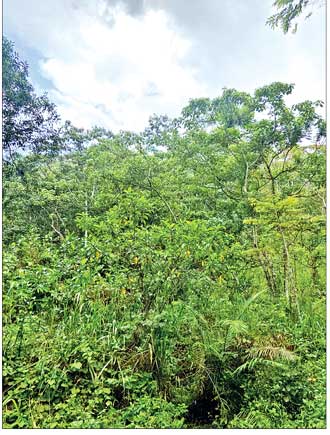Monday Feb 16, 2026
Monday Feb 16, 2026
Tuesday, 4 June 2024 00:02 - - {{hitsCtrl.values.hits}}
 As the world gears up to celebrate World Environment Day on 5 June, on the theme of land restoration, desertification, and drought resilience, Dilmah, in collaboration with Kahawatte Plantations and Dilmah Agricultural Innovation Nucleus, will inaugurate its agro-forestry program at Rilhena.
As the world gears up to celebrate World Environment Day on 5 June, on the theme of land restoration, desertification, and drought resilience, Dilmah, in collaboration with Kahawatte Plantations and Dilmah Agricultural Innovation Nucleus, will inaugurate its agro-forestry program at Rilhena.
The launch will be marked by the planting of trees, carefully selected to thrive in the local landscape, including species of commercial value for non-timber use. This is birthed from the success of one its flagship reforestation projects: Dilmah’s Endane Biodiversity Corridor, which has evolved to serve as a model for ecosystem restoration initiatives across tea estates.
Endane Biodiversity Corridor, a feat to engineer a forest pathway through degraded tea lands, connecting two separate forest reserves to enhance biodiversity has had remarkable success. It has georeferenced 188 threatened tree species and 545 other tree species using GNSS technology, enabling continuous monitoring and planted over 4000 seedlings including 40 globally threatened species. It has also conserved nearly 50 threatened tree species through its nursery. Dilmah is now set to embrace this reforestation model to its other tea lands beginning with an abandoned tea land in its Rilhena Estate.
The project site was chosen, following a feasibility analysis utilising available maps and plantation data, where approximately 1000 hectares of abandoned land have been identified within Kahawatte Plantations as being suitable for agroforestry. Commercial crops such as Garcinia, Pepper, Durian and Rambutan are among the species to be planted.
Integrating tree-based agroforestry in tea cultivation enhances biodiversity, enriches soil with organic matter and nutrients, reduces erosion by stabilising soil with tree roots, improves water retention and results in economic diversification by providing additional income sources from fruits and nuts.
Dilmah’s green restoration endeavours are aligned with Sri Lanka’s commitment to Nationally Determined Contributions (NDC) of increasing green cover by 32% by 2030. Globally, the United Nations urges nations to fulfil their pledge to restore 1 billion degraded hectares of land over the next decade, an area equivalent to the size of China. Beyond enhancing biodiversity, restoring degraded ecosystems holds promise as a public health intervention, promoting overall health and well-being.
 Through its sustainability and conservation arm, Dilmah Conservation, the family tea company has embarked on numerous green restoration initiatives. These include collaborating with the Urban Development Authority to enhance the educational value of Beddagana Wetland Park and restoring several mangrove forest patches, including 2.4 acres in the Anawilundawa Wetland Sanctuary and 2.5 acres in the Kappal-Adi Kite Lagoon in Kalpitiya.
Through its sustainability and conservation arm, Dilmah Conservation, the family tea company has embarked on numerous green restoration initiatives. These include collaborating with the Urban Development Authority to enhance the educational value of Beddagana Wetland Park and restoring several mangrove forest patches, including 2.4 acres in the Anawilundawa Wetland Sanctuary and 2.5 acres in the Kappal-Adi Kite Lagoon in Kalpitiya.